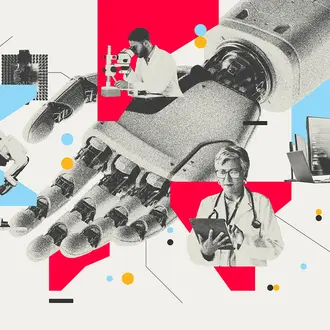Leadership
Writing a new leadership playbook
Organizations and leaders need a new set of behaviors for the digital age. Here’s what to jettison, what to hold on to, and what to develop.
What will define great leadership in the new digital economy? A new report from MIT Sloan senior lecturer finds it is a combination of emerging and enduring behaviors, while simultaneously rejecting what Ready calls eroding behaviors.
But it doesn’t stop there: recognizing the behaviors is only the first, small step. The real challenge is in confronting cultural inertia and making new behaviors the norm throughout an organization.
Ready conducted the report, “The New Leadership Playbook for the Digital Age,” with MIT Sloan Management Review and Cognizant. The team launched its findings recently at the World Economic Forum in Davos. Below, Ready discusses the central findings about the challenges facing today’s organizations and their leaders.
Why is this study important?
We are all very familiar with the megatrends that are making this world a more complex place. We have studied the changing nature of competition, digitalization, the changing demographics, and the changing nature of work. But what amazed us was that there have been precious few, fact-based studies on the leadership and leadership development implications of these megatrends. We need to better understand what defines great leadership in this changing world.
It seems like we’ve been talking about this forever, and yet so many people remain stuck.
That’s exactly the point. We’ve been talking a lot about these things, yet somehow our organizations aren’t changing, or to be fair, are changing very slowly. Too much talk lends itself to hyperbole. This study brings facts to the forefront of this challenge. We studied more than 4,000 people’s views from over 120 countries around the world. We conducted dozens of deep-dive interviews with C-suite leaders and conducted focus groups with next-gen leaders. We are now able to move beyond conjecture.
Only 9% of respondents felt their leaders had the skills or demonstrated the behaviors to lead in the digital age.
What surprised you?
A few surprises, some troubling and some reassuring. The most troubling surprise was the extent to which we, as managers and leaders, feel our companies are unprepared to lead in the new economy. The capability gaps were, in many cases, staggering. Only 9% of respondents felt that their leaders had the skills or demonstrated the behaviors it will take to lead in the digital age. Only 12% indicated that their leaders possessed the right mindset to lead in the digital world. And only 13% strongly agreed that their companies were ready to compete, let alone win, in this new environment. We also found what we call an “awareness gap” and a “resolution gap,” both of which are detailed in the study results.
In your study you mention the cumulative effect on these gaps is the creation of what you call cultural inertia.
Take these three major gaps together, and you have a pretty powerful disincentive to changing. This is particularly true of companies that are lucky enough to still be successful, but are facing trying times ahead, perhaps without knowing it yet, or at least not wanting to face the facts yet. It’s easy to blame culture because then it seems daunting to even try to do something about it. Most people view changing their organization’s culture as above their pay grade, so they complain, place blame elsewhere, and oddly that somehow feels comforting.
You did say there were some heartening surprises.
There were dozens of them. People, and not just the next-gens, are demanding that their organizations create work environments that are flatter, more transparent, more inclusive, and more purpose-driven. They aren’t just talking about it anymore — they are demanding it. They are voting with their feet and leaving organizations that continue to be top-down in their approaches to leading. What I also found heartwarming was that some leader behaviors were thought to be vitally important no matter what — things like trust, integrity, honesty, purpose, and a commitment to continuous communication.
Those are enduring behaviors, one of the categories of leadership behavior that you refer to as the “three Es.” Which of the three Es are good? Which ones are bad?
The three E behaviors are eroding, emerging, and enduring. Eroding behaviors are the ones that were manifestations of how leaders led in simpler times: top-down decision-making, long-term strategic plans, tell-sell style communication patterns, and sadly, mostly male-dominated. Emerging behaviors are the ones we kept hearing about as central to leading in the new economy: empathy, authenticity, transparency, humility, inclusiveness, collaboration and connectedness, experimentation, and the like. Enduring behaviors are the ones that have stood the test of time, were important 50 years ago, are important today, and will continue to be important 50 years from now.
So if we know the behaviors we need to demonstrate to lead in the digital age, what’s keeping us back?
We can’t forget about the culture thing and this troubling notion of cultural inertia. Talking about behaviors is one thing. But if that’s all you do, what you have done is create a new vocabulary but haven’t written a new playbook for those words. That’s why we called the study "The New Leadership Playbook for the Digital Age." What we are recommending is for leaders to get beyond the words and start creating the conditions for success to take hold in their organizations. In order to do that we found it useful to look at some companies that are already living in the future. What these leaders have done is to create a collective leadership capability, and they’ve set that tone by adopting what we call the hallmark mindsets of great leadership communities, which are detailed in the report.
How do leaders make this happen?Leaders need to shape and articulate a powerful narrative about what great leadership looks like and feels like in their organizations and then socialize this in honest dialogue with their teams. They need to demonstrate that they are willing and ready to change by actively role-modeling this narrative. They need to bake this narrative into their talent management systems and processes to ensure that a new kind of leader emerges in their organizations. And they need to make sure that this new playbook opens the gates for a whole new and diverse generation of leaders.




